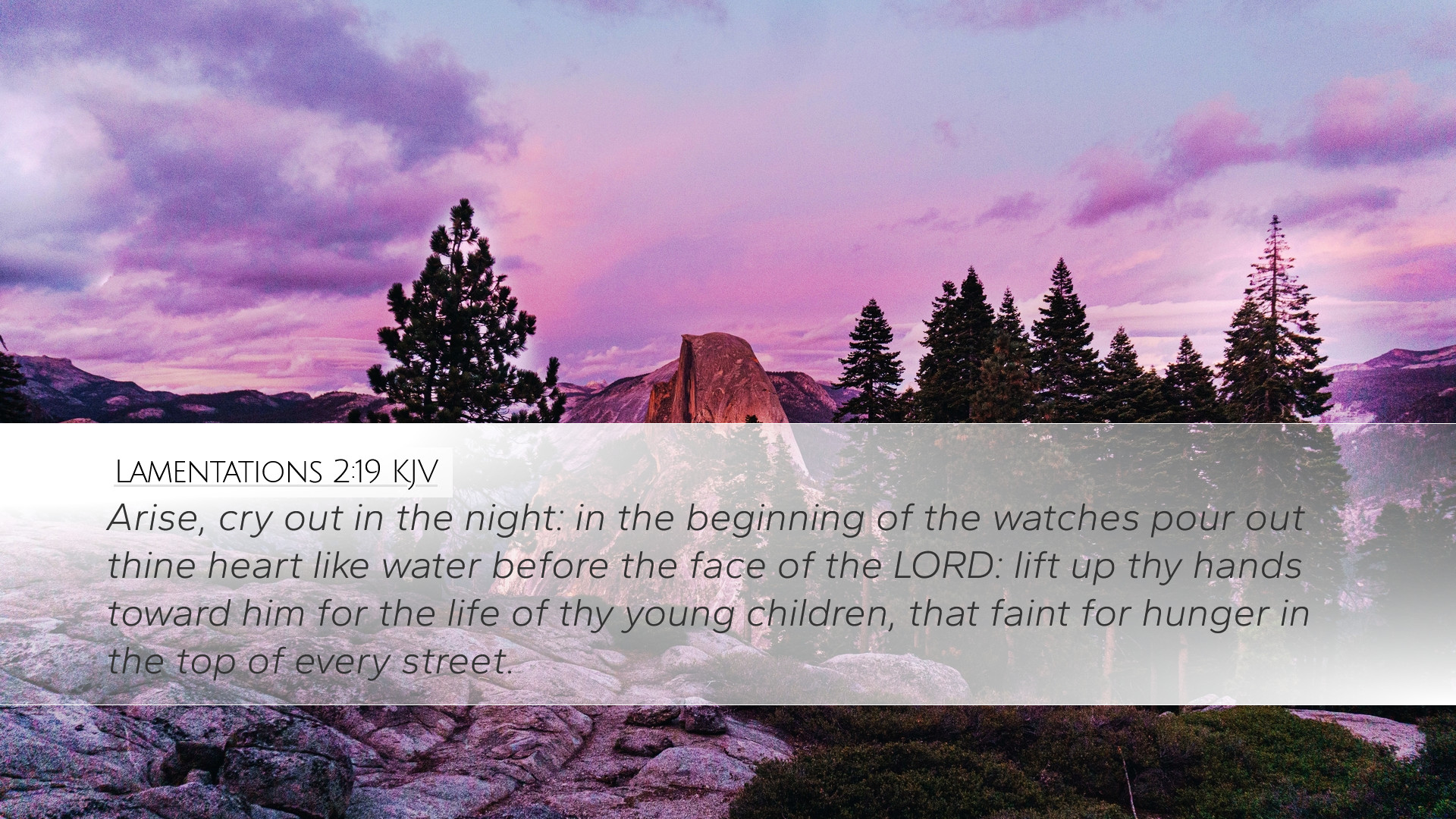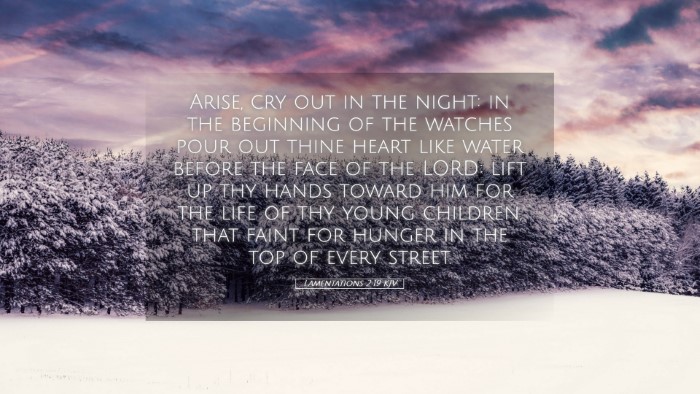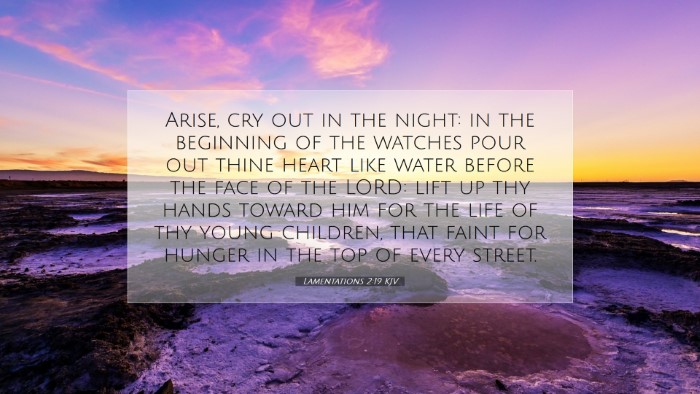Lamentations 2:19 - A Commentary
Verse Context: Lamentations 2:19 reads, "Arise, cry out in the night, as the watches of the night begin; pour out your heart like water in the presence of the Lord. Lift up your hands to him for the lives of your children, who faint from hunger at every street corner."
This verse is a call to deep introspection and heartfelt prayer in the face of suffering and despair. The prophet speaks to the people of Jerusalem following the destruction of the city and the associated calamities. It emerges as a poignant expression of anguish, parental concern, and desperate supplication to God amidst great tribulation.
Commentary Insights
From Matthew Henry:
Henry emphasizes the significance of "crying out in the night," which suggests a time of darkness and despair. The night symbolizes the spiritual and emotional turmoil that the people experienced. He encourages believers to pour out their hearts, not just outwardly, but deeply and authentically before God.
Pleading for the Next Generation: The reference to children is particularly striking. The Hebrew people needed to intercede not only for themselves but for their children, who represent the future of the community. Henry interprets this as a reminder of the long-lasting impact of sin and the need for prevailing prayer on behalf of our descendants.
Henry argues that when one is overwhelmed with sorrow, it is vital to turn to the Lord, emphasizing that genuine lamentation and prayer are both acts of faith and despair that draw the heart closer to God.
From Albert Barnes:
Barnes explains that this summons to prayer involves an urgent and heartfelt cry during the watches of the night, indicating a pivotal time of spiritual awakening and desperation. He urges that such endeavors in prayer must be intense and sincere, as indicated by pouring out one’s heart "like water."
Children as the Focus of Lament:
He notes the significance of interceding for the children of Jerusalem who are suffering. This serves as a metaphor for the broader implications of sin affecting not just individuals but entire families and future generations. Barnes suggests that this illustrates a profound sorrow for one's lineage and the consequences of collective disobedience.
Furthermore, Barnes highlights the necessity of communal action—in times of distress, the faithful are called to lift their hands in prayer collectively. He posits that such gestures are powerful and signify desperation and hope, intertwining human suffering with divine mercy.
From Adam Clarke:
Clarke provides a rich interpretation of the text, noting the symbolism present in the actions described. According to him, "arise" is not merely a physical action but also an encouragement to elevate one’s spiritual state and response to God. Clarke views this moment as a pivotal call to repentance, awakening from spiritual lethargy.
Devotion in Despair:
He articulates that pouring out of the heart signifies an unreserved expression of grief and supplication. This contrasts with perfunctory prayers, emphasizing that God desires honesty in the midst of suffering. Clarke reinforces the need for earnestness in prayer and the outward physical manifestations of inner turmoil — as shown in the act of lifting hands.
Clarke ultimately reflects on the communal desperation and urgency for divine intervention, mirroring the social plight of the people gathered at the city gates as they experienced hunger and devastation. His commentary underscores the cyclical nature of sin and consequence, and the essential role of prayer in bringing forth divine mercy.
Theological Implications
This verse, alongside the commentaries, invites believers to reflect on the intersection of human suffering and divine responsiveness. The act of crying out in desperation is a theological stance acknowledging human frailty amidst divine sovereignty.
- The Nature of Prayer: The emphasis on pouring out one’s heart shows that prayer is not merely ritualistic; it is deeply relational and authentic. This encourages individuals to approach God in sincerity and vulnerability.
- Parental Responsibility: The distress for children emphasizes the biblical theme of generational consequences of sin and the necessity for prayer and protection over future generations. It invites reflection on the responsibility of parents and communities for the spiritual welfare of their youth.
- Community Involvement: The context encourages communal lamentation and prayer, asserting that seeking God's mercy reveals the interconnectedness of human experiences within a faith community.
- The Role of Suffering: Suffering and loss often prompt more profound engagement with God; thus, it can be seen as a catalyst for spiritual renewal and growth.
Conclusion
Lamentations 2:19 serves as an instructional passage on the necessity of earnest prayer, particularly during times of suffering. The collective outcry reflects the reality of communal grief and the need to intercede for the helpless, especially the children. This verse speaks deeply into the hearts of pastors, students, theologians, and scholars, reminding them of the potency of honest supplication in the face of adversity and the essential role prayer plays in the fabric of community life. As they examine this passage through the lens of these renowned commentaries, they are challenged to cultivate a deep, sincere relationship with God grounded in heartfelt prayer and devotion.


